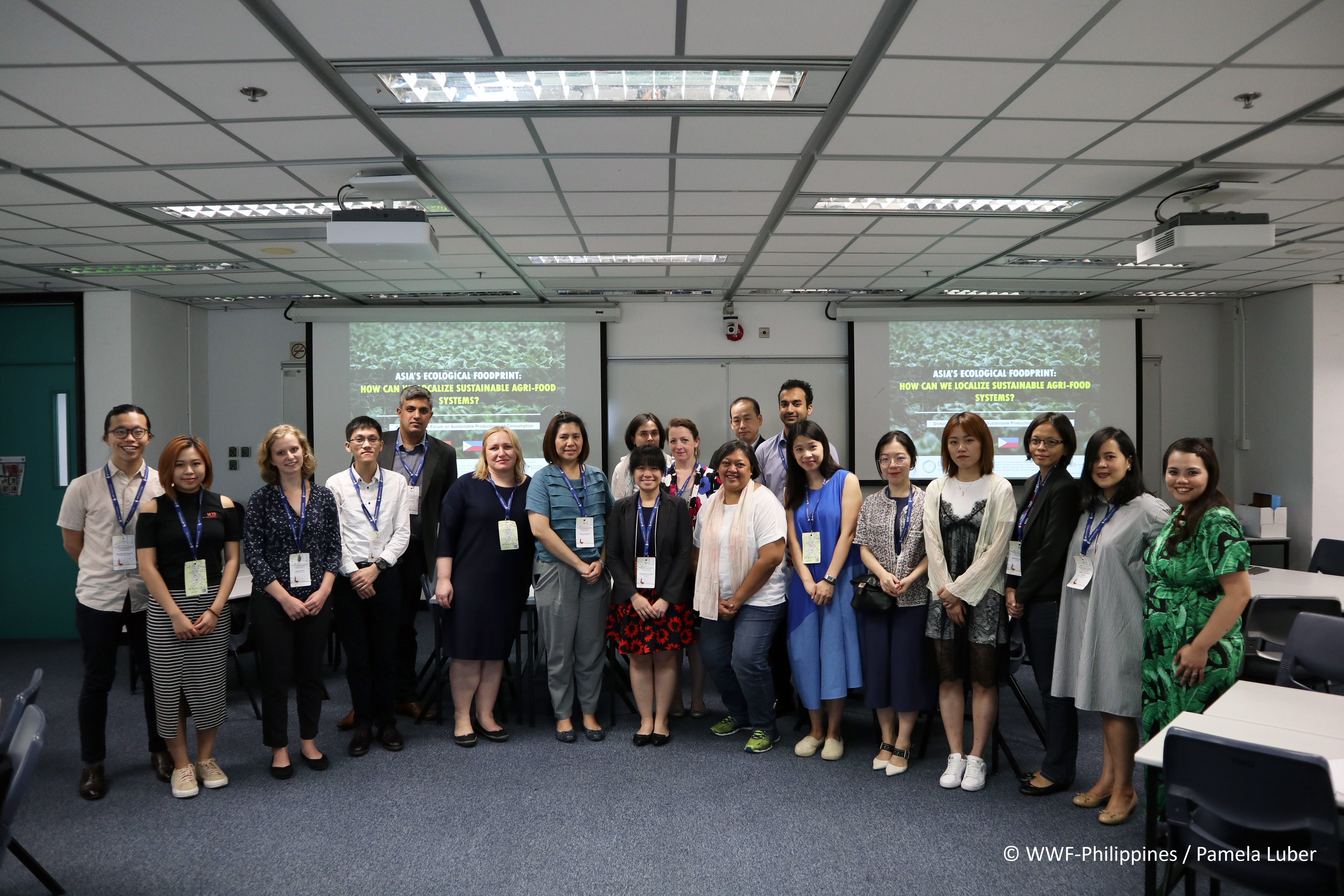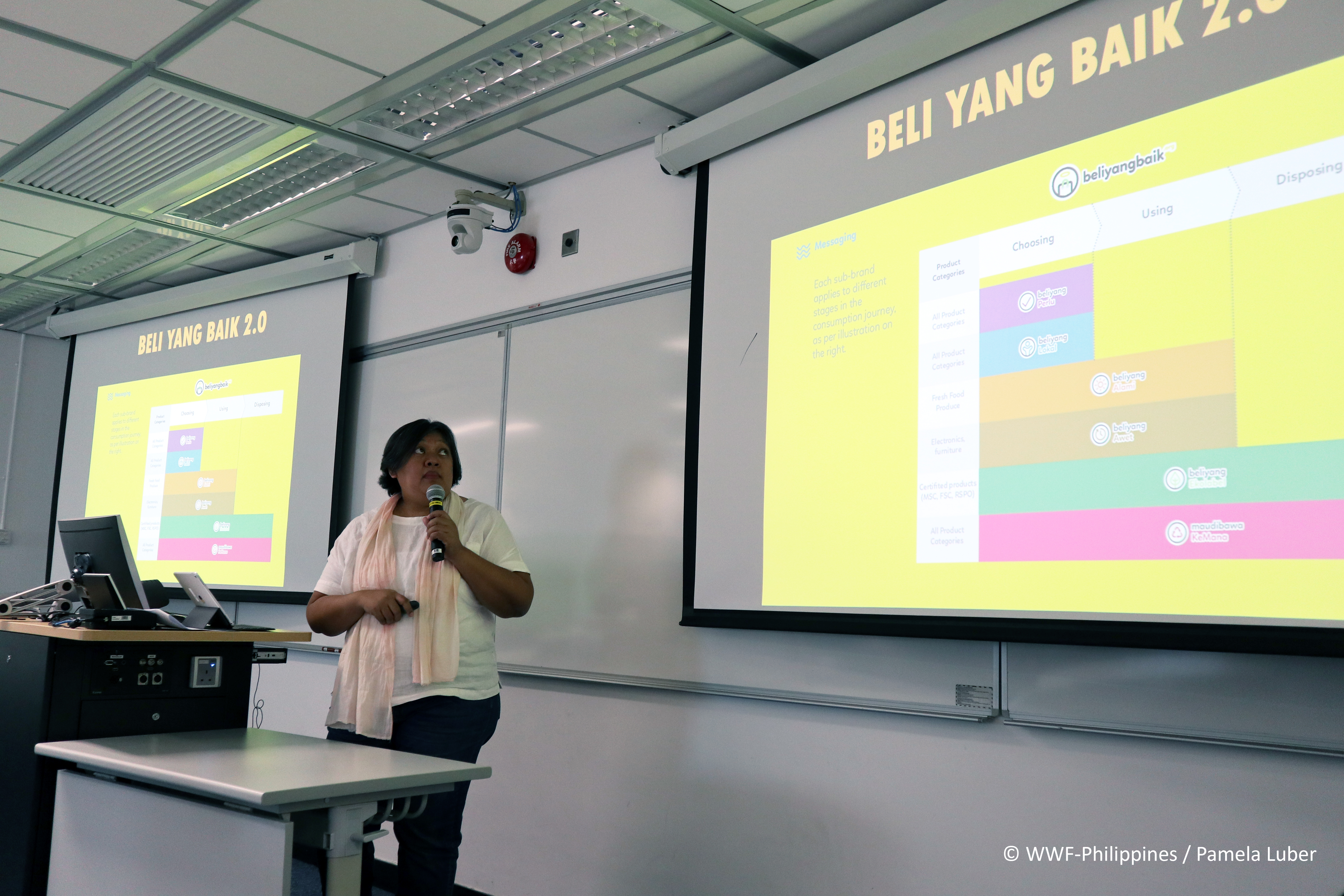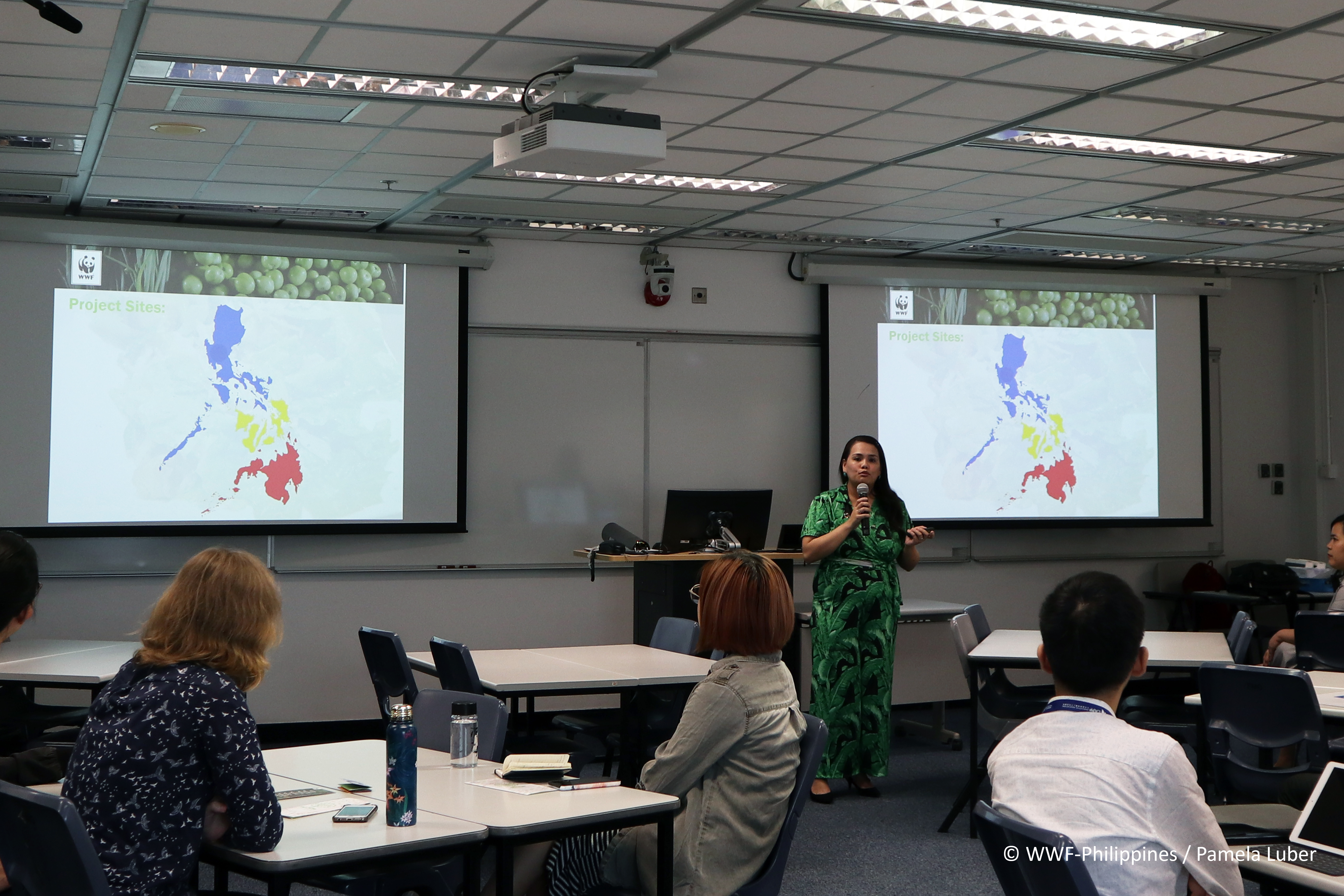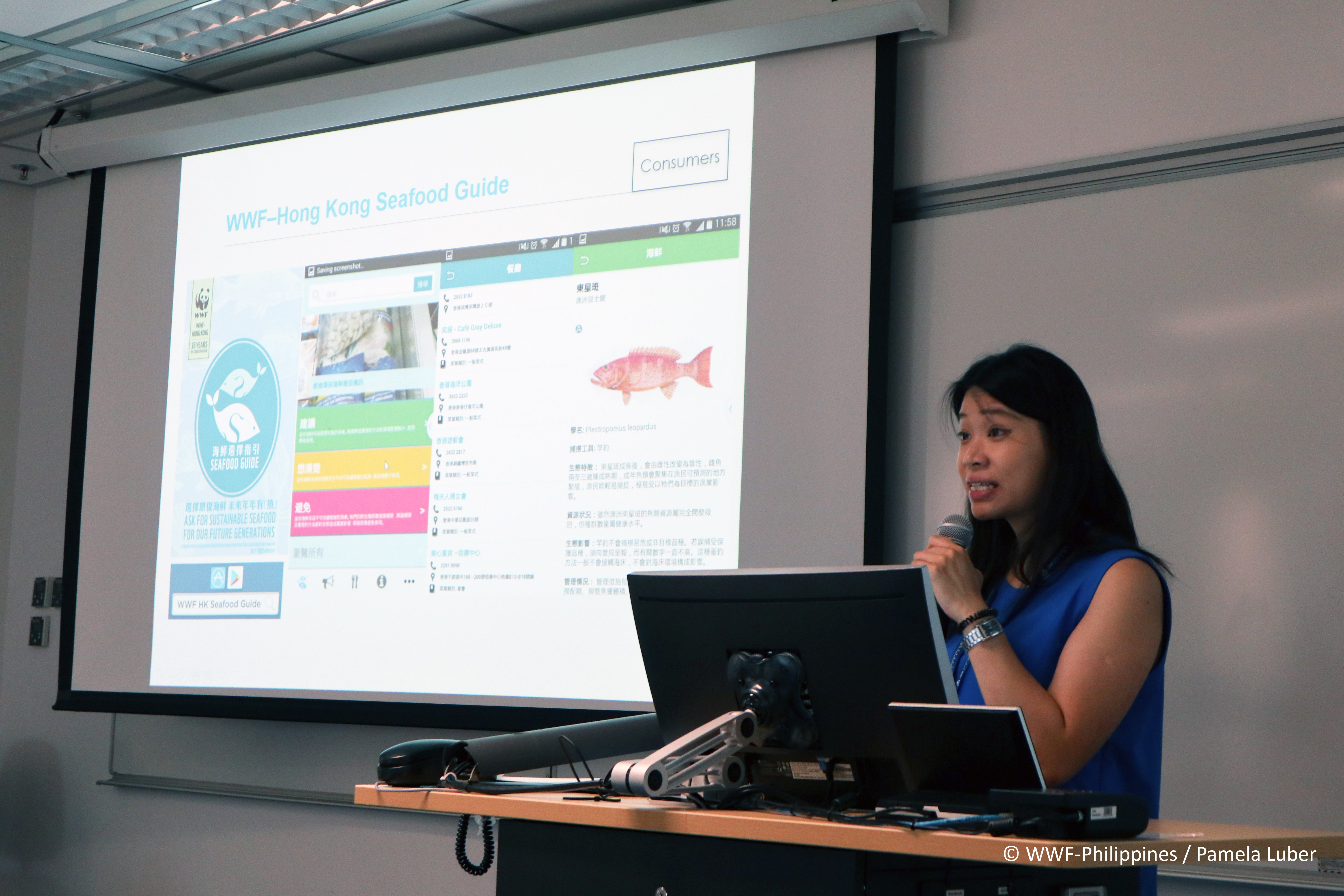Bridging Sustainability Research with Policy and Practice: The Sustainable Diner at the Global Research Forum on Sustainable Production and Consumption 2019
June 2019

Group photo with the attendees of the break-out session, “Asia’s Ecological Foodprint: How Can We Localize Sustainable Agri-Food Systems?”, together with representatives from WWF-Philippines, WWF-Indonesia, and WWF-Hong Kong.
Representatives from The Sustainable Diner: A Key Ingredient for Sustainable Tourism project of the World Wide Fund for Nature (WWF) Philippines attended and participated in the 4th International Conference of the Global Research Forum on Sustainable Production and Consumption 2019, held from June 26 to 29 at the Hong Kong University of Science and Technology (HKUST). Co-organized by the Institute for Global Environment Strategies (IGES), National Institute of Environmental Studies, SWITCH to Green Initiative, SWITCH Asia Programme, and the Asia-Europe Environment Forum, the aim of the three-day gathering of professionals from the private sector, governments, research institutes, the academe, and civic organizations is to enhance the development and adoption of production and consumption policies, practices, and systems which meet basic needs - especially of the poor and the vulnerable - and provide prosperity, while conserving natural resources and protecting the environment.

Dewi Satriani, Conservation Communications Manager of WWF-Indonesia, talks about one of their marketing campaigns called “Beli Yang Baik”, which focuses on teaching consumers how they can contribute to sustainable consumption and production in the country through their individual choices and actions.
The Sustainable Diner project of WWF-Philippines, together with the Sustainable Consumption and Production (SCP) project of WWF-Indonesia and the Sustainable Seafood project of WWF-Hong Kong, have co-organized a side session entitled “Asia’s Ecological Foodprint: How Can We Localize Sustainable Agri-Food Systems?”. This session tackles and discusses the current unsustainable consumption and production practices being experienced in the region’s various industries, mainly in food service, food retail, palm oil, and fisheries. The panel was facilitated by Liezl Stuart Del Rosario, The Sustainable Diner project’s Policy Specialist, who opened the session with a brief introduction on WWF, followed by the first panel presentation from WWF-Indonesia.
Dewi Satriani, WWF-Indonesia’s Conservation Communications Manager and Project Manager for Sustainable Consumption and Production, mainly shared her work in handling the flagship SCP campaign of WWF-Indonesia called “Beli Yang Baik,” translated to “Buy Better.” This encourages Indonesian consumers to assess the sustainability of products first before purchasing. The campaign has divided specific consumer actions into three categories: choosing, using, and disposing. It highlights six specific consumer actions: “Beli Yang Perlu,” or “Buy What Is Necessary,” “Beli Yang Lokal,” or “Buy Local,” “Beli Yang Awet,” or “Buy What Is Durable,” “Beli Yang Alami” or “Buy Natural,” “Beli Yang Ekolabel” or “Buy Those With Ecolabels,” and “Maudibawa Kemana,” which promotes recycling and being mindful of where our wastes go after usage. Satriani also talked about the importance of optimizing digital channels such as YouTube, Instagram, and Facebook when creating and promoting local consumer campaigns, stating that environmental organizations such as WWF need to know where they can find their local target audience in order to successfully deliver key campaign messages. “Localizing means knowing where and how to talk to your consumers, because different consumers from different countries are present in different platforms,” says Satriani. “It is our job to make sure that we deliver our message correctly, not just in terms of data, but also in terms of aligning our strategies with the habits of our consumers”.

Melody Melo-Rijk, WWF’s Project Manager for Sustainable Consumption and Production in the Philippines, presents the various project sites of The Sustainable Diner in the country, emphasizing the need to properly localize campaigns that target change in consumption behavior.
Meanwhile, Melody Melo-Rijk, WWF’s Project Manager for Sustainable Consumption and Production in the Philippines, emphasized the importance of understanding cultural context when it comes to localizing campaigns and scientific research for specific countries. She shared that in order for environmental campaigns to be truly successful, organizations need to consider a country’s socio-political environment, linguistics, physical attributes, and traditions. For sustainable consumption and production, a movement that relies a lot on consumer behavior change, these factors are important because they drive an individual’s motivation, aspiration, and mindset, for something as lofty as a career choice to something more basic as day-to-day purchases. “In the Philippines, the concept of sustainability is still an up and coming term for most of our target market, but food waste is something that is culturally inherent for Filipinos to avoid, which is why we see an opportunity in communicating the reduction of food waste as an important individual contribution to sustainability,” says Melo-Rijk. “For The Sustainable Diner project, localizing has led us to pin-pointing which aspects of sustainable consumption and production can be easily understood by the Filipino people based on existing socio-cultural norms and beliefs. This has led to the development of our four pillars: sourcing locally, lessening food waste, avoiding the use of single-use plastics, and conserving resources such as energy and water.”

Jovy Chan, WWF-Hong Kong’s Project Manager for Footprint, discussing the Seafood Guide developed for their local Sustainable Seafood project.
Ending the panel presentations was Jovy Chan, WWF-Hong Kong’s Project Manager for Footprint. She talked about how seafood consumption heavily influences the sustainability of fisheries supply chains around the world. Zeroing in on Hong Kong, a place that ranks second in terms of seafood consumption in Asia and is the eighth largest seafood consuming society in the world, she expressed that if the people of Hong Kong would choose to support sustainable seafood, the effect on local and global supply chains would be significant. One of the campaigns that they are promoting is the WWF Seafood Guide, which consumers can refer to so that they can make more sustainable choices when shopping and dining. “We created the seafood guide with a simple goal, and that is to start a new dining trend here in Hong Kong that makes caring for our oceans a part of every consumer’s responsibility,” says Chan. “Our guide covers more than 70 popular seafood items that can be found in local wet markets, supermarkets, frozen food shops, and restaurants. Sustainable seafood is a huge global movement, and in order to localize this, we needed to know the types of seafood available in Hong Kong, as well as how people usually purchase and consume them. It makes it easier for us to craft a relatable message that fits the mindsets and lifestyles of people from Hong Kong.”
In behalf of our colleagues from WWF-Indonesia and WWF-Hong Kong, WWF-Philippines would like to thank the organizers and co-organizers of the Global Research Forum on Sustainable Production and Consumption for allowing the various SCP projects of the WWF network to share our case studies and best practices with an esteemed audience. Truly, when we work together on a global scale in promoting SCP principles and practices, it is possible for us to slowly but surely change how our local societies think about sustainable food systems.
The Sustainable Diner project, under WWF-Philippines’ Sustainable Consumption and Production, is part of the International Climate Initiative (IKI). The Federal Ministry for the Environment, Nature Conservation, and Nuclear Safety (BMU) supports this initiative on the basis of a decision adopted by the German Bundestag.
For more information, please contact:
Melody Melo-Rijk
Project Manager
mmelorijk@wwf.org.ph
For media arrangements, please contact:
Pamela Luber
Integrated Marketing Communications Specialist
pluber@wwf.org.ph
Lorayne Roque
Sustainable Consumer Specialist
lroque@wwf.org.ph
